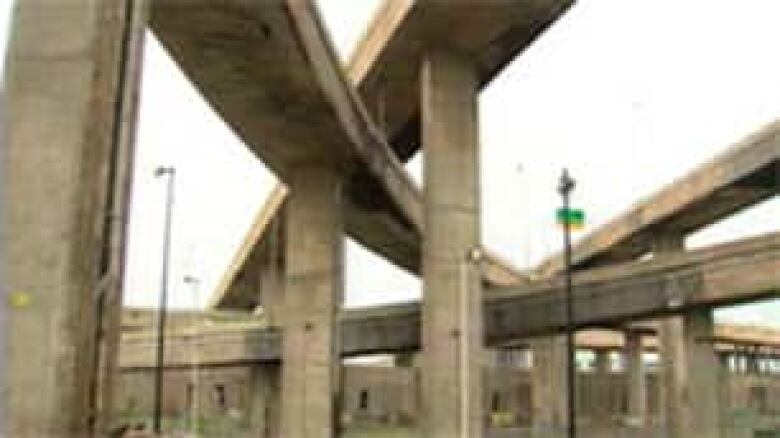Coalition presents new Turcot proposal
The Quebec government has to favour public transit over car traffic as it finalizes plans for the reconstruction of the Turcot interchange, a coalition of community and environmental groups as well as public health officials said on Thursday.
The group presented a new proposal for the interchange which it says would create a 40 per cent drop in car traffic, during a news conference in Montreal.
The proposal, designed by architect Pierre Brisset and Concordia University urban planning professor Pierre Gauthier, calls for a smaller sized structure, which would reduce the total number of lanes from 18 to 10 and the number of on and off ramps from 12 to 8.
The structure would be complemented by reserved lanes for public transit; a light rail line linking downtown to Trudeau airport; a tramway to Lachine; bike paths and a 75-hectare park at the foot of the Saint-Jacques escarpment.
The result would be that residents would be encouraged to use public transit reducing the number of cars passing through the infrastructure from 290,000 a day, to 185,000, the group said.
The proposal would also eliminate the need to demolish neighbourhoods in Saint-Henri and Cte-Saint-Paul, said Brisset.
"This whole notion of building highways in urban areas is supposed to be a thing of the past, of the last century," said Brisset.
And, the proposal would cost no more than two thirds of the $1.5 billion the government said its plan would cost.
Supported by public health official
The coalitions proposal is supported by Dr. Louis Drouin, head of the Montreal Public Health Departments division of urban environment and health, who said Montrealers have expressed their opposition to the plans put forward by the province.
"If, thanks to this new scenario, 100,000 people trade their cars in, in favour of active and public transit, you can imagine there would be significant gains for public health," said Drouin.

According to the latest reports, the province has made significant changes to its controversial plans to rebuild the aging interchange, including a reduction in the number of residential units that would be expropriated from 160 to just 60.
However, the plans are still reported to expect the number of vehicles using the interchange on a daily basis is to climb from 280,000 to 304,000. But, the coalition said those plans fail to take into account the rising price of gas as well as studies that show Montrealers are increasingly turning towards public transit.
The reconstruction of the Turcot interchange is expected to be completed by 2016.












_(720p).jpg)


 OFFICIAL HD MUSIC VIDEO.jpg)
.jpg)



























































































